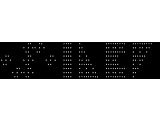 Sidef is a modern, high-level programming language designed for versatile general-purpose applications, drawing inspiration from the principles of Ruby, Raku, and Julia. Sidef encompasses various key elements, such as object-oriented and functional programming, functional pattern matching, optional lazy evaluation, multiple dispatch, lexical scoping, closures, keyword arguments, regular expressions, integration with Perl modules, optional dynamic type checking, and robust support for big intege
Sidef is a modern, high-level programming language designed for versatile general-purpose applications, drawing inspiration from the principles of Ruby, Raku, and Julia. Sidef encompasses various key elements, such as object-oriented and functional programming, functional pattern matching, optional lazy evaluation, multiple dispatch, lexical scoping, closures, keyword arguments, regular expressions, integration with Perl modules, optional dynamic type checking, and robust support for big intege
 Ursa helps you write code that will last a long time: a simple, general-purpose programming language that is easy to pick up and will work the same way long into the future.
Ursa helps you write code that will last a long time: a simple, general-purpose programming language that is easy to pick up and will work the same way long into the future.
 Hunspell is the spell checker of LibreOffice, OpenOffice.org, Mozilla Firefox & Thunderbird, Google Chrome, and it is also used by proprietary software packages, like macOS, InDesign, memoQ, Opera and SDL Trados. Main features: Extended support for language peculiarities; Unicode character encoding, compounding and complex morphology. Improved suggestion using n-gram similarity, rule and dictionary based pronunciation data. Morphological analysis, stemming and generation. Hunsp
Hunspell is the spell checker of LibreOffice, OpenOffice.org, Mozilla Firefox & Thunderbird, Google Chrome, and it is also used by proprietary software packages, like macOS, InDesign, memoQ, Opera and SDL Trados. Main features: Extended support for language peculiarities; Unicode character encoding, compounding and complex morphology. Improved suggestion using n-gram similarity, rule and dictionary based pronunciation data. Morphological analysis, stemming and generation. Hunsp
 TypeScript is a programming language developed and maintained by Microsoft. It is a strict syntactical superset of JavaScript and adds optional static typing to the language. TypeScript is designed for the development of large applications and transcompiles to JavaScript.[4] As TypeScript is a superset of JavaScript, existing JavaScript programs are also valid TypeScript programs. TypeScript may be used to develop JavaScript applications for both client-side and server-side execution (as with N
TypeScript is a programming language developed and maintained by Microsoft. It is a strict syntactical superset of JavaScript and adds optional static typing to the language. TypeScript is designed for the development of large applications and transcompiles to JavaScript.[4] As TypeScript is a superset of JavaScript, existing JavaScript programs are also valid TypeScript programs. TypeScript may be used to develop JavaScript applications for both client-side and server-side execution (as with N
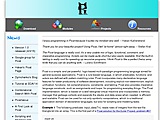 Picat is a rule and logic based programming language. Its syntax is derived from pattern matching rules, but allows traditional declarative and imperative programming and is suitable for general-purpose development. It runs in a VM, with automatic stack/heap allocation and garbage collection.
Picat is a rule and logic based programming language. Its syntax is derived from pattern matching rules, but allows traditional declarative and imperative programming and is suitable for general-purpose development. It runs in a VM, with automatic stack/heap allocation and garbage collection.
 A typed language with modern flexible syntax. In the process of becoming usable. It takes features I like from other languages: - Type inference - Main C control flow statements - Python-like foreach and forange - functions, modules, classes and more.
A typed language with modern flexible syntax. In the process of becoming usable. It takes features I like from other languages: - Type inference - Main C control flow statements - Python-like foreach and forange - functions, modules, classes and more.
 The Afnix writing system is a multi-threaded functional writing system with dynamic symbol bindings that support the object oriented paradigm. The Afnix writing system is a comprehensive set of application clients, modules and services. The original distribution contains the core interpreter with additional clients like the compiler, the librarian and the debugger. The distribution contains also a rich set of modules that are dedicated to a particular domains.
The Afnix writing system is a multi-threaded functional writing system with dynamic symbol bindings that support the object oriented paradigm. The Afnix writing system is a comprehensive set of application clients, modules and services. The original distribution contains the core interpreter with additional clients like the compiler, the librarian and the debugger. The distribution contains also a rich set of modules that are dedicated to a particular domains.
 Crack is an imperative, object-oriented programming language deriving concepts from Java, C++ and Python.
Crack is an imperative, object-oriented programming language deriving concepts from Java, C++ and Python.
 The Ring is an Innovative and practical general-purpose multi-paradigm language. The supported programming paradigms are Imperative, Procedural, Object-Oriented, Functional, Meta programming, Declarative programming using nested structures, and Natural programming. The language is portable (Windows, Linux, macOS, Android, etc.) and can be used to create Console, GUI, Web, Games and Mobile applications. The language is designed to be Simple, Small, Flexible and Fast. The language is simple, try
The Ring is an Innovative and practical general-purpose multi-paradigm language. The supported programming paradigms are Imperative, Procedural, Object-Oriented, Functional, Meta programming, Declarative programming using nested structures, and Natural programming. The language is portable (Windows, Linux, macOS, Android, etc.) and can be used to create Console, GUI, Web, Games and Mobile applications. The language is designed to be Simple, Small, Flexible and Fast. The language is simple, try
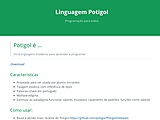 Potigol is a programming language for novices. It has a C-style syntax, and Portuguese-based language constructs. It's a scripting language, with support for arrays, hashes, and string interpolation, math functions etc.
Potigol is a programming language for novices. It has a C-style syntax, and Portuguese-based language constructs. It's a scripting language, with support for arrays, hashes, and string interpolation, math functions etc.
 A Python2 module to search and download subtitles, forked from persicope by Patrick Dessalle. Includes a caja extension.
A Python2 module to search and download subtitles, forked from persicope by Patrick Dessalle. Includes a caja extension.
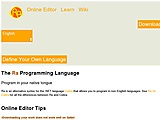 Program in your native tongue. Ra is an alternative syntax for the .NET language Cobra that allows you to program in non-English languages.
Program in your native tongue. Ra is an alternative syntax for the .NET language Cobra that allows you to program in non-English languages.
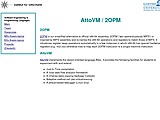 Just-in-time compiler with support for adaptive optimisation and copying garbage collection, for a small object-oriented teaching language. Includes an assembler/debugger for executing a simplified version of x86-64 assembly. Intended to help students learn about assembly language, compilation, but especially about modern language implementation, especially with dynamic compilation techniques.
Just-in-time compiler with support for adaptive optimisation and copying garbage collection, for a small object-oriented teaching language. Includes an assembler/debugger for executing a simplified version of x86-64 assembly. Intended to help students learn about assembly language, compilation, but especially about modern language implementation, especially with dynamic compilation techniques.
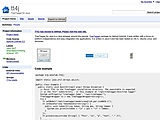 TreeTagger for Java is a Java wrapper around the popular TreeTagger package by Helmut Schmid. It was written with a focus on platform-independence and easy integration into applications. It is written in Java 5 and has been tested on OS X, Ubuntu Linux, and Windows.
TreeTagger for Java is a Java wrapper around the popular TreeTagger package by Helmut Schmid. It was written with a focus on platform-independence and easy integration into applications. It is written in Java 5 and has been tested on OS X, Ubuntu Linux, and Windows.
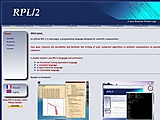 RPL/2 (Reverse Polish Lisp/2) is a langage derived from the RPL made by Hewlett-Packard for its HP-28S. It has some extensions (preprocessor, compilated libraries, new functions, parallel computing), a TeX output, and can draw graphics.
RPL/2 (Reverse Polish Lisp/2) is a langage derived from the RPL made by Hewlett-Packard for its HP-28S. It has some extensions (preprocessor, compilated libraries, new functions, parallel computing), a TeX output, and can draw graphics.
|